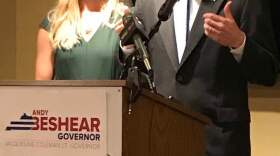When Kentucky Attorney General Andy Beshear's top deputy was busted for using kickbacks and bribes for political donations, Beshear vowed to donate all of the tainted money from his 2015 campaign account to charity.
That was two years ago. The money is still there. But now Beshear is running for governor, bringing more scrutiny to his campaign.
Beshear has cooperated with authorities, and federal officials have said he had no knowledge of the scheme. But that hasn't stopped Republicans, including Gov. Matt Bevin and his allies, from using it to portray Beshear as corrupt.
Beshear again vowed Monday, to donate any tainted contributions to Common Cause, a government watchdog group, but only after the Registry of Election Finance completes an audit of his 2015 account. The audit has taken two and a half years so far. A similar audit of Bevin's 2015 campaign cash also remains unfinished.
"I'd love for it to finish tomorrow," Beshear said. "But we are going to provide every single dollar."
Just how many dollars is hard to calculate.
Jonathan Smith, Beshear's campaign spokesman, said the FBI has told them "there may be concerns with roughly $6,000" of the more than $4.9 million Beshear raised for his 2015 primary and general election campaigns.
But it could be several times more than that, according to testimony about the scheme.
Beshear received $2,000 in contributions from Tim Longmeyer, his former chief deputy, now serving a federal prison sentence for accepting bribes and kickbacks involving state contracts. Last month, Longmeyer testified in the trial of James Sullivan, a former Democratic lobbyist who was convicted of bribing Longmeyer in 2016. During that trial, Longmeyer testified he received or controlled up to $400,000 through the scheme, with at least half of that money donated to Democratic candidates and causes -- including Beshear's 2015 campaign for attorney general.
State law limits individual donors to a maximum of $2,000 in each election cycle. But Longmeyer testified he would hand out money freely to family and friends and ask them to make donations. Records show Longmeyer's family members, including his parents, siblings and in-laws, donated a total of $8,250 to Beshear's 2015 campaign.
It's unclear how much of that money is tainted. Longmeyer testified he could not remember which family members made political donations on his behalf. He said he was sure his father, John Longmeyer, made donations for him. Larry O'Bryan, an associate of Longmeyer and a former Democratic political operative, testified he wrote checks adding up to nearly $100,000 to John Longmeyer's law firm. But John Longmeyer testified he never received that money.
"I didn't get a check like that," the former deputy's father said. "All of those are figures I wouldn't forget."
Longmeyer accepted kickbacks from MC Squared Consulting, a small company based in Lexingington.
Records show the company's employees donated $4,500 to Beshear's campaign. In addition, Sullivan and his wife and O'Bryan and his wife donated a combined $8,000.
Altogether, those numbers add up to over $22,000. Records show Beshear has just over $26,000 left in his 2015 primary and general election campaign accounts.
John Steffen, director of the Registry of Election Finance, said political candidates often wait until the registry completes its required audit before donating any leftover balances to charity. That's because the audits, especially for large accounts, could reveal violations that carry small fines or require refunds to some donors.
The Registry of Election Finance is governed by a seven-member board. The governor appoints four members from a list of candidates provided by the Republican and Democratic parties and fair election groups. The attorney general, auditor and secretary of state each have one appointment.






